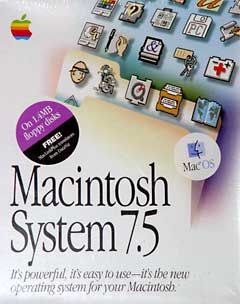As of 31 January 1999, Apple has posted System 7.5.3 for free download (19 disk images!) – and don’t forget the System 7.5.5 updater.
“If you are running the machines as servers, why do you use System 7.5.5? Won’t a properly updated 7.1 perform better? Are there any advantages (other than interface enhancements) that 7.5.5 has?”

I prefer the solid Open Transport 1.1.2 support in 7.5.5 and all the ethernet driver updates. I don’t mind sacrificing a bit of memory over what 7.1 carried for a built-in drag and drop manager, Shrinkwrap .smi support during installs, proper 8.1 connectivity handling (since 8.1 doesn’t quite read the desktop database the same way as 7.5, but 7.1 is almost foreign to it), Timbuktu runs smoother with full TCP/IP support, Speed Doubler server assists copies over the network to the server by routing through full TCP/IP connectivity rather than slower AppleTalk protocols, but only with Open Transport and 7.5.5.
I could keep going on with this list . . . OK . . . I will. SCSI Manager 4.3 support, better General Controls support, larger drive support up to 4GB, which is good, since 7.1 won’t read drives this large and won’t network them out correctly (7.1 is limited to 2GB partitions). Conflict Catcher is much more stable and better known to me under 7.5.5 with all the extensions. I can remove all of the PPC code from the System file and Finder to make a cleaner 68k system software that seems much more stable than 7.1. Multi Device server software such as SCSIShare and Portshare can take advantage of Open Transport benefits, ARA seems much more stable and better able to maintain connection under 7.5.5. I can upgrade the AppleShare extension for the Chooser with a very modern 3.7.4 without issue, which maintains much better and more stable connections with other machines than the v 3.05 or whatever with 7.1. LaserWriter printer support with sharing and desktop icons is more compatible with the built in manager within 7.5.
A more solid memory handling routine is found as well as improved caching with Speed Doubler support. Better FileMaker 3.0 Server support than 7.1.
I guess it boils down to Open Transport and Speed Doubler support, and better TCP/IP handling built into the OS. Of course there are other overhead issues, but really, they’re not that important if you can clean up the extra extensions you don’t need. As well, file support and large drive support is much greater under 7.5.5, meaning you don’t have to take great amounts of time repartitioning or dealing with file copies in the future.
The last thing I can think of is Retrospect backup support, which is much easier to establish with 7.5.5 rather than 7.1, simply because of the multitasking radical. Instead of having to force users to disconnect file server support during a backup, and then wait for re-establishment, the backup unit can be attached directly to the server, and Retrospect 4.0 can back up all the connected 7.5.5 and 8.1 machines remotely. Given the option of 7.1, if any of those remote machines have drives greater than 2 GB, then they will not report file sizes correctly and will fail in transfer.
The reason I know this last issue is because I tried it. I used 7.1 on a scanner/printer server for a 5 user network of 8.1 loaded Quadra’s. The file server in use was a IIsi 65 MB 4.3GB drive. I attempted to let Retrospect log into that file server and simply backup the entire drive – that failed because of weird errors. So I connected via the Chooser to the file server, and it reported 4.073GB in use on a 4.053 GB drive. Every file attempted to copy from the server to the hard drive complained that the file was too big – an additional 4.073GB needed. So, in this case, 7.1 failed. I still have it being a printer/ARA dial-in/SCSIshare scanner server, but the backup tape drive had to go to the IIsi, where it’s worked flawlessly, even backing up the scanner server.
Now, I mentioned before, that SCSIshare wasn’t really supported correctly under 7.1, and it fails, whether I use the 3.0 update or not. The problem is memory handling and protocols under classic AppleTalk. So, when more than 6 MB is installed on the LC II, I’ll be punching it up to 7.5.5 and increasing the disk cache from minimum, just to keep things stable and kosher with Open Transport installed.
Keywords: #system755
Short link: http://goo.gl/TK3rx7
searchword: system755

